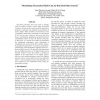35 search results - page 3 / 7 » Improving Quality-of-Control Using Flexible Timing Constrain... |
RTCSA
2006
IEEE
14 years 1 months ago
2006
IEEE
(m,k)-firm constraints have been used to schedule tasks in soft/firm real-time systems under overloaded conditions. In general, they are provided by application designers to guara...
ECOWS
2007
Springer
14 years 1 months ago
2007
Springer
For improved flexibility and concurrent usage existing transaction management models for Web services relax the isolation property of Web service-based transactions. Correctness o...
ASPDAC
2008
ACM
13 years 9 months ago
2008
ACM
This paper proposes a novel Behavioral Synthesis method that improves performance of synthesized circuits utilizing specialized functional units effectively. Specialized functional...
MANSCI
2008
13 years 7 months ago
2008
We study large-scale service systems with multiple customer classes and many statistically identical servers. The following question is addressed: How many servers are required (s...
JVCIR
2008
13 years 7 months ago
2008
In this article we present three key ideas which together form a flexible framework for maximizing user-perceived quality under given resources with modern video codecs (H.264). F...

